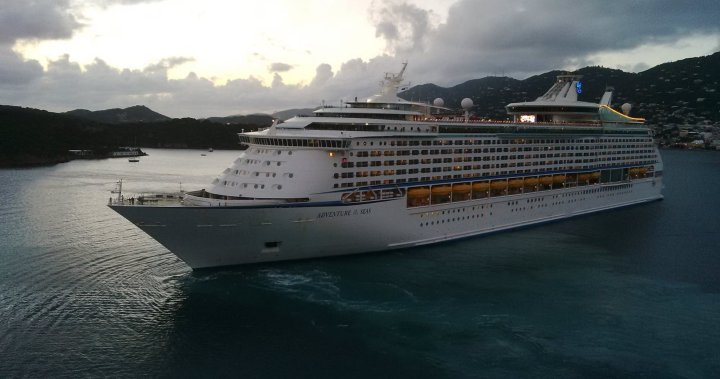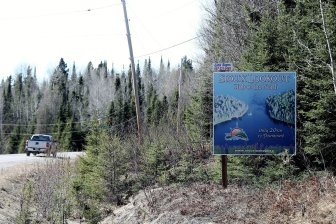Canada’s biggest bank, RBC, and other lenders may want to reconsider how they reward top performing employees with air travel and luxury cruises, critics say.
That’s because such trips generate significant carbon emissions, which critics, including others in the financial sector, say are at odds with many banks stated climate goals.
Fifteen hundred top performers from RBC were flown to the Caribbean in January on an eight-night all-inclusive luxury cruise aboard a large ship, according to social media posts by participating bank employees.
Pinnacle of employee recognition or ‘carbon bomb’?
The cruises are considered the “pinnacle of employee recognition” for RBC staff from around the world, a now retired RBC regional president said in a LinkedIn posting in 2019.
But such employee recognition programs are also triggering discussion and debate among environmentalists, corporate trip planners and top investment bankers.
Richard Brooks, of Stand.earth, whose non-profit group tracks the climate bona fides of the country’s big banks, likens the RBC flights and at-sea voyage to “a carbon bomb cruise.”
RBC declined to comment on that suggestion, but said cruises are “an important way for RBC to recognize and reward a select number of employees whose efforts have made an exemplary and positive impact for our clients, communities and colleagues during the past year.”
RBC spokesman Andrew Block also said the cruises offered “a learning and development opportunity.” He did not elaborate.
Brooks thinks RBC and other big banks and financial services companies who offer such trips should reconsider them, saying what was considered “normal behavior” 5, 10 or 30 years ago may no longer be appropriate amid a climate crisis.
Like many corporations, RBC calls itself a climate leader, and sees its role as “helping our clients reduce their emissions and achieve their climate goals,” according to its website.
But Brooks suggests big banks like RBC must go further than helping their clients and look at how they spend their own money more closely.
“It’s a practice that several of the banks do,” Brooks said of the cruises and trip rewards.
“There’s insurance companies that we’re aware of. We found out, also do similar types of things. It’s really speaking out of both sides of their mouths,” Brooks said.

Cruising’s economic power and carbon footprint
Cruising, as it turns out, is both a global economic powerhouse but one of the most carbon-intensive types of travel, according to Bryan Comer, an analyst with the International Council on Clean Transportation, and numerous other analyses, including from Bloomberg News and emissions tracking firm Climate TRACE.
Globally, the cruise industry says it generates over $150 billion in economic activity a year, supporting 1.17 million jobs paying more than $50 billion in salaries and wages, according to the Cruise Lines International Association, the industry’s main group.
Get the latest National news.
Sent to your email, every day.
But most cruise ships still burn a form of bunker fuel that spews what’s known as ‘black carbon.’ This substance accelerates global warming by trapping more heat on the ground. It also can form deposits over snow and ice, accelerating glacier melt.
Newer-generation cruise liners are better and burn liquified natural gas, which is about 25 per cent cleaner than bunker fuels.
This includes the new and world’s largest cruise ship, the Icon of the Seas, whose maiden voyage sailed from Miami on January 27. RBC staffers were on a different luxury cruise ship.
Burning liquified gas to power a cruise ship can, in turn, release methane, which is a much more potent gas than carbon dioxide when it comes to global warming, according to Environment Canada and the US Environmental Protect Agency.
The cruise industry, though, says methane slips are being tightly monitored.
Mackinzie McFarland, a spokesperson for Cruise Line International Association, pointed to research from SEA-LNG, a group that advocates for decarbonizing the shipping industry, that concluded that methane slip “levels have fallen four-fold since the early 2000s.”
McFarland also pointed out that gas, more commonly known as liquified natural gas, is still the cleanest, widely-available fuel.
The cruise industry says it is committed to de-carbonizing its business as much as possible, and as quickly as possible. Still, even the most modern cruise ships rely on liquified fossil gas which, while less polluting than bunker oil, still produces emissions as well as methane leaks.
Global News / Cruise Lines International Association
The cruise industry says it is changing its polluting ways and improving operations, pointing out, for example, how modern cruise ships convert waste to energy, or how next-generation cruise ships are 20 to 25 per cent more efficient than their older counterparts.
In 2021, Pacific Northwest ports that cater to cruise ships sailing in Vancouver, B.C., and Seattle, unveiled a cross-border pact to cut emissions. Measures include more electric plug-in facilities in ports so ships can use short electric power and turn off their bunker fuel engines.
Luggage and food loading vehicles are also increasingly electric, instead of gas-powered.
None of those improvements, though, considers the fact that most cruise passengers fly to ports of departure and back, boosting emissions to carbon-heavy adventures.
Changing culture for corporate giveaways
Marie-France Lajoie, the founder and president of Montreal-based Zeste Incentive, says her corporate customers are much more attuned to their environmental footprint than in years past. In many cases, their own employees are pressuring management to be more environmentally-focused.
She personally doesn’t recommend cruises to clients and sees them less in her world since she learned how much pollution and carbon emissions they can generate.
“I’m not throwing stones at anybody. I travel, and I fly. We are providing memories and experiences that people don’t have every day and sometimes you have to leave the country for them,” Lajoie said.
Yet Lajoie said more of her clients are seeking less carbon-intensive outings. Though she offers snowmobiling trips in her mix, she now offers traditional dog sledding adventures in the Laurentians. Or bike trips through the Niagara wine country in Ontario.
“We are doing more activities that pollute less, like electric boat outings, hiking and e-bike trips, and fewer car rentals,” she said. “I think you can reconcile the two. Still have reward trips, but also make them more green.”
If foreign travel is involved, Lajoie said corporations can now add corporate social responsibility components locally with tree planting and community park and garden work..
RBC’S response
In a written statement to Global News, RBC spokesman Andrew Block sidestepped all environmental questions about the cruise and how it aligned with its climate policies.
His statement said: “As part of our commitment to doing our part in addressing climate change, RBC has established goals to reduce emissions associated with our operations, including travel. We’ve committed to sourcing 100% of our electricity from renewable and non-emitting sources and reducing greenhouse gas emissions in our operations by 70% by 2025.”
RBC says its performance conferences offer learning and development opportunities, and that the bank is actively working to reduce its emissions footprint.
Global News / RBC
What other banks and credit unions are doing
RBC is not the only large financial services company that flies people on lavish corporate getaways to incentivize staff to deliver top sales and operational performances. So, Global News asked other major Canadian banks whether they also offer cruise rewards.
Laurentian Bank used to offer cruises for employee performances, but stopped the practice “at least 10 years ago,” spokesperson Merick Seguin said.
In an emailed statement, Laurentian Bank indicated that it stopped offering cruises as rewards several years ago.
Global News / Laurentian Bank
“We conducted a review and asked ourselves whether this was the best way to reward our staff after considering several factors. We decided to go towards different ways of recognizing the work of our employees,” Seguin said. That includes special training workers covet, depending on the bank unit they work in.
“Air travel is reserved for business needs,” Seguin added.
National Bank of Canada (NBC) said it plans to reduce its emissions 25% by 2025, through energy efficiency initiatives and unspecified policies governing employee travel. The bank would neither confirm nor deny it offers cruises. “Nothing to add,” spokeswoman Stephanie Rousseau replied when asked.
Vancity Credit Union stated its business has focused on people and the planet “long before ESG was common parlance.” It said it does not offer rewards like cruises or vacations to its employees, saying its rewards program is “entirely financially based.”
“All employees share in the success of our business annually through our profit-sharing rewards program,” Vancity spokesperson Shannon Miller said. “Some roles, such as mortgage brokers or wealth advisors, have incentive plans tied to revenue targets – those incentive programs also lead to financial rewards.”
Maggie Hall, a spokesperson for Equitable Bank, said the lender “doesn’t segregate top performing employees from others with incentivization like corporate outings, vacations or team-building exercises, nor do we offer reward packages with this kind of incentivization.”
Team-building exercises for its business are always local, she said.
TD Bank responded, but declined to say if its offers flights and cruises. Other majors, including BMO, CIBC, and Scotiabank, didn’t respond to our queries.
Changing the culture
Tom Rand, an independent investment manager and founder of ArcTern Ventures in Toronto, has written three books explaining the ways the global economy should and can be decoupled from highly-polluting sources of energy.
Rand says all of us must now change how we think and act about the environment – and the RBC cruise example simply demonstrates how oil and gas are so intricately woven into our everyday lives, to the point that most people don’t even think about it.
“It’s easy to point fingers at big bad banks and say ‘there’s a problem,’ but we all consume fossil fuels,” Rand says. “This is not about villains and heroes. This is about how all of us are complicit in the problem and we all need to think about what leadership means.”

Big trips ‘tricky’ for employers
Jana Tulloch, Founder and CEO of Tulloch Consulting, a human resources consulting firm, said big trips as incentive awards for top performers are tricky for employers.
Both younger and older workers have climate change “foremost in their mind as a really critical issue that must be addressed,” she said, but not everyone shares that view.
“You can go from an individual who thinks that a trip like this is great because, you know, it’s a nice and free trip. ‘I get to go on a cruise’,” said Tulloch, based in Vancouver. “And then another individual who would just be kind of really abhorred about the idea of that and what it can do to our environment and not be supportive of it.”
Tulloch said urges clients to think about broader branding and employees’ views when considering recognition rewards to ensure people practices match company values.
“I talk a lot about alignment. Companies need to be clear on what their values are. Putting those out into statements and making sure that they are integrated into practices, including rewards and recognition,”she said. “Sometimes in large companies, making sure that your ‘people’ practices are aligned with values can get lost because people aren’t actually talking to each other.



